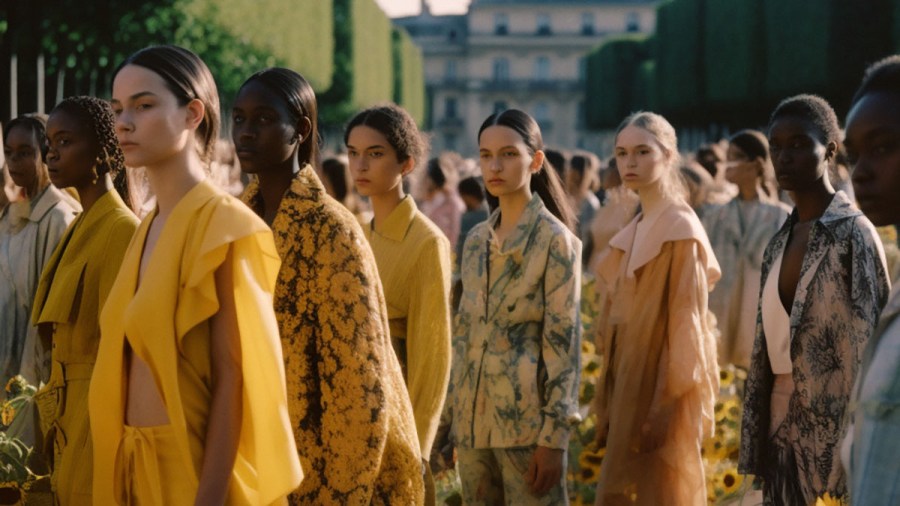Creatives compete in first AI fashion week. How will it impact the industry?

You don’t need a private jet to get a front row view of the first ever AI Fashion Week. You can log on and see the virtual designs from your laptop.
The event has drawn hundreds of submissions using artificial intelligence text-to-image generators like Midjourney to create models, clothing collections and runway shows.
The tools are helping to democratize the creative process, said Nima Abbasi, a partner at Maison Meta, which organized the competition.
The following is an edited transcript of Abbasi’s conversation with Marketplace’s Meghan McCarty Carino:
Nima Abbasi: We had over 400 submissions, literally from around the world. And what was really interesting for us, there were many people who had submitted amazing collections that you could imagine being on any runway in any of the major cities, you know, Paris, Milan, London, New York, but many of them had never had any experience in the fashion space, they had not gone to any particular school, they had not worked in any particular fashion brand. You know, we had one lady based in New York, who is 57 years old, never worked in fashion is actually a class action lawsuit lawyer with a practice of 19 people, and was able to use her imagination and her creativity to create an insanely beautiful collection. And so this was extremely pleasing to us, you know, to see that the current AI tools, and they’re improving every day, really does open up this gateway into a new world.
Meghan McCarty Carino: So how does this creative process differ from sort of the traditional creative process in fashion design?
Abbasi: What we think about it is very, very similar, actually. So if you think about, you know, a world famous creative director, Pharrell Williams was recently named Creative Director at Louis Vuitton men. So he comes to the table and, you know, sits in front of his team making references and explaining and describing what he sees as the next collection for Louis Vuitton. You know, he’s had no really formal fashion training, he doesn’t necessarily know patterns, or draping or other sort of technical skills that are taught in schools where people go to learn fashion design. And then, you know, the team goes away and comes back with references, ideas, that gets refined into, you know, actual clothed samples that they see they refine again to get the final collection. So the process is very similar, except, you know, those dozens of people sitting in front of Pharrell Williams, to some extent, their work can be done with the AI brain.
McCarty Carino: So will any of these synthetic designs be moving IRL?
Abbasi: We announced the 10 finalists. So those are the people who got the most votes. And they go in front of our jury, they are reviewing those 10 final collections right now. We take those three finalists. And we’ve developed the world’s first AI Fashion Incubator with revolve group, which is a very large ecommerce and fashion tech company. And we’re taking these three winners through the incubator to help them develop their brand to produce their collections that then will be sold online on revolve.com.
McCarty Carino: Have you gotten any pushback in the fashion industry over using AI in ways that could potentially replace human work?
Abbasi: Yes. So you know, whenever there’s new technology, there’s always sort of sense of fear of what it might do, or how it might impact me. And I think we’ve seen this, you know, we thought about when the car came out, I’m sure carriage drivers were really scared about their job. But I think as we see, as new technologies come, you have opportunities to work differently or to do different things. And I think that’s what we try to communicate to the brands that we work with that, yes, this technology will potentially replace some of the work that was done by some people, but other things will come up either within that organization or outside. And the most important thing we see is that we can’t be afraid of this technology. It’s here, it will be used. If you pretend it’s not there, it’s not going to go away. So I think the way to think about it is, you know, how do I embrace this? How do I use it as my assistant in a way that allows me to do my job better and more effectively?
The future of this podcast starts with you.
Every day, the “Marketplace Tech” team demystifies the digital economy with stories that explore more than just Big Tech. We’re committed to covering topics that matter to you and the world around us, diving deep into how technology intersects with climate change, inequity, and disinformation.
As part of a nonprofit newsroom, we’re counting on listeners like you to keep this public service paywall-free and available to all.
Support “Marketplace Tech” in any amount today and become a partner in our mission.












